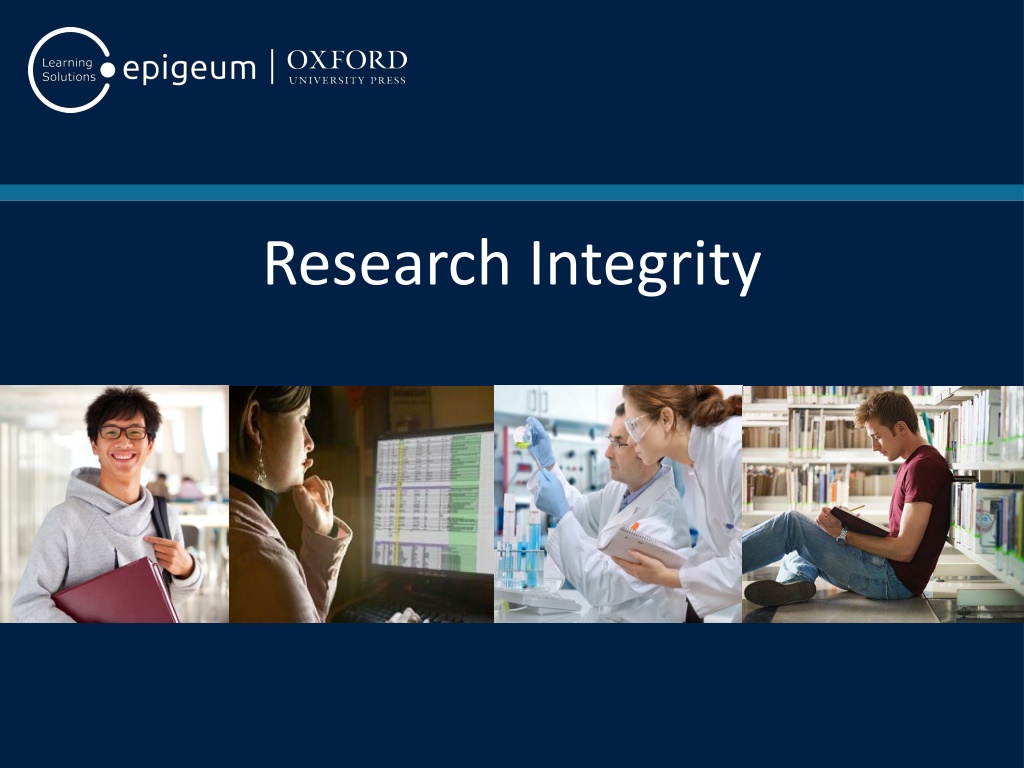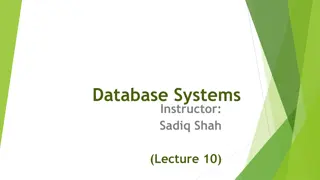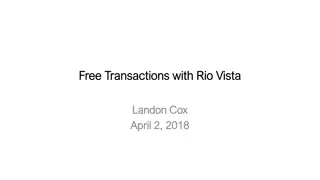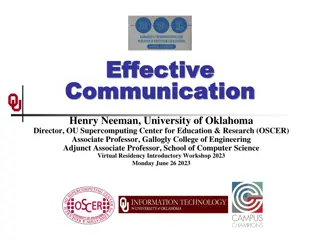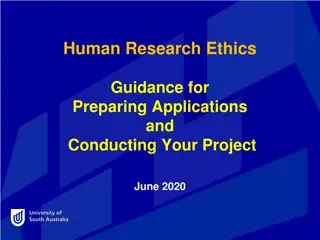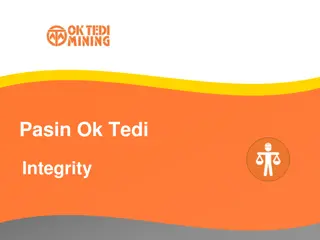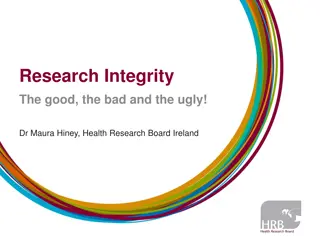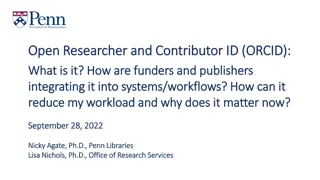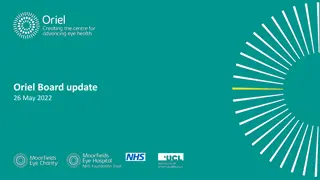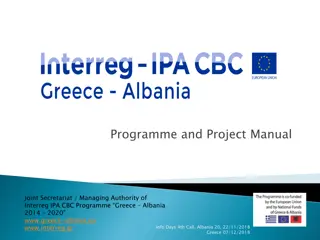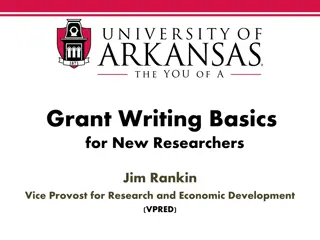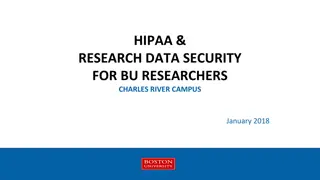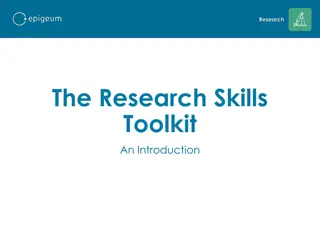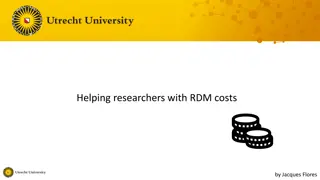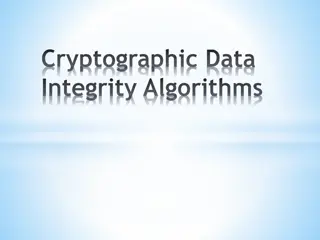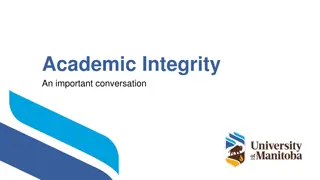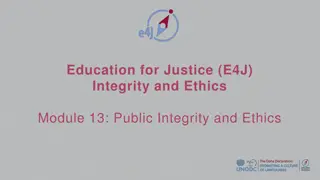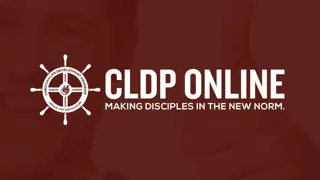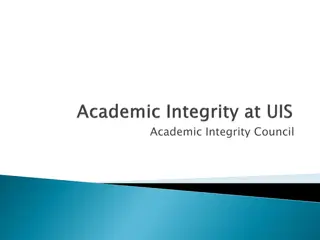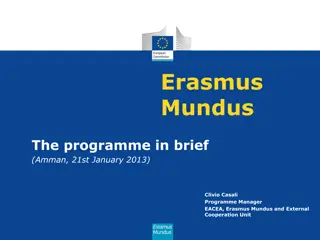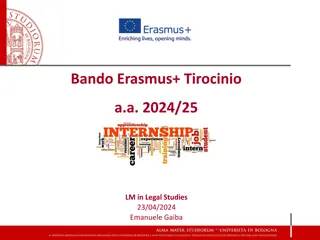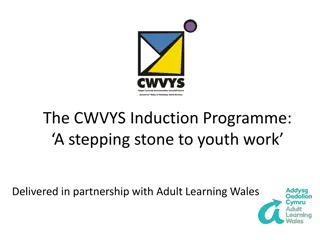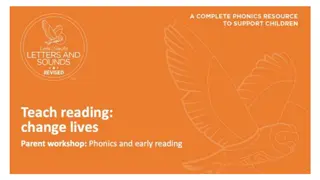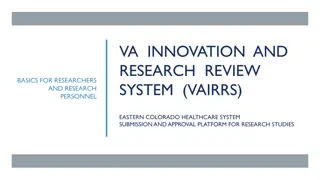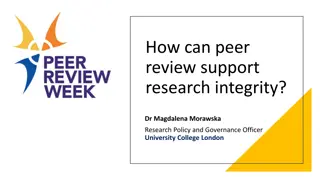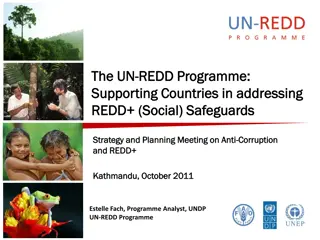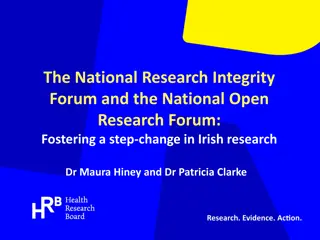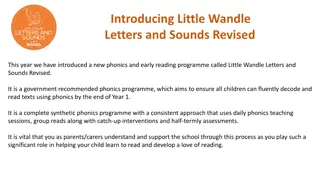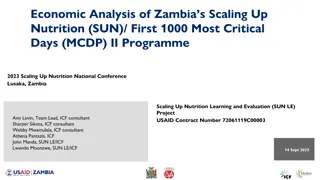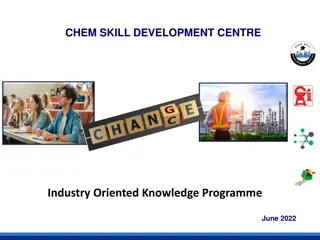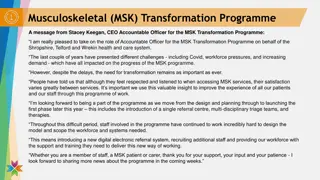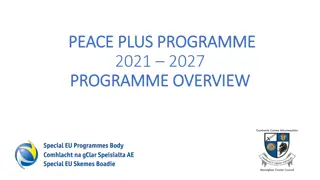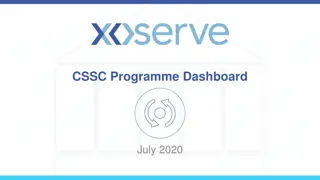Comprehensive Research Integrity Programme for Researchers
Research Integrity Programme offering practical advice and professional guidance for researchers at all career stages. Led by renowned advisors and contributors, the program covers key aspects of research ethics and responsibilities, ensuring adherence to best practices throughout the research process. Featuring a diverse panel of experts, including faculty members and research governance professionals, the program aims to equip participants with essential skills and knowledge to navigate the complexities of research integrity effectively.
Download Presentation

Please find below an Image/Link to download the presentation.
The content on the website is provided AS IS for your information and personal use only. It may not be sold, licensed, or shared on other websites without obtaining consent from the author. Download presentation by click this link. If you encounter any issues during the download, it is possible that the publisher has removed the file from their server.
E N D
Presentation Transcript
Research Integrity Programme structure: Number of courses: 1 course, 5 faculty versions Core activities: 5 hours Additional activities: 25 32 hours per version
Research Integrity Research Integrity ensures researchers understand their professional responsibilities. The course provides practical advice on dealing with the complex issues that can arise while planning, conducting and reporting research. Suitable for undergraduate, postgraduate and early-career researchers covering every stage of the research process.
Contributors LEAD ADVISOR: Professor Nick Steneck, Professor Emeritus, University of Michigan, USA Co-founder of the World Conferences on Research Integrity. Professor Steneck was instrumental in the drafting and adoption of the Singapore Statement on Research Integrity (2010).
Contributors Dr Andrew Rawnsley, Executive Committee, UK Council for Graduate Education; Research Governance and Training Manager, Teesside University Dr Lorelle Meadows, Assistant Dean of Academic Programs, College of Engineering, University of Michigan Tony Mayer, Advisor to Nanyang Technological University, Singapore on Research Integrity matters; Co- organiser and Co-Chair of the 1st and 2nd World Conferences on Research Integrity Dr Terry May,Faculty Conflict of Interest Information Officer, Michigan State University Dr Karen Melham, Researcher in Ethics, Centre for Health Law and Emerging Technologies (HeLEX), University of Oxford Professor Melissa Anderson, Professor of Higher Education, Department of Organizational Leadership, Policy & Development, University of Minnesota Professor Raymond De Vries, Professor, Center for Bioethics and Social Sciences in Medicine, University of Michigan Medical School
Contributors Development group members Brunel University National University of Ireland, Galway Dublin City University University College Dublin Durham University University of Birmingham Edith Cowan University University of Greenwich European Molecular Biology Organization University of Huddersfield King Abdullah University of Science & Technology University of Liverpool Lancaster University University of Michigan Macquarie University University of Oxford Michigan State University University of Sheffield Michigan Technological University Wayne State University Nanyang Technological University Western Michigan University
Background Research Integrity ensures researchers understand their professional responsibilities. The course provides practical advice on dealing with the complex issues that can arise while planning, conducting and reporting research. Suitable for undergraduate, postgraduate and early-career researchers covering every stage of the research process.
Overview ABOUT THIS COURSE: This course covers every stage of the research process. Research Integrity can help meet funding agency requirements, such as providing evidence of training in the Research Integrity. As a result, universities can be confident their staff are working to the highest possible integrity standards. Suitable for undergraduate, postgraduate and early-career researchers.
Content Research Integrity will ensure that researchers understand their professional responsibilities. It covers every stage of the research process and is available in 5 faculty versions: Biomedical Sciences Natural and Physical Sciences Engineering and Technology Social and Behavioural Sciences Arts and Humanities Core activities: 5 hours per faculty version Additional activities: 25 32 hours per faculty version
Syllabus Courses Activities Core Hours: 5 hours Research Integrity (Biomedical Sciences) Author: Dr Raymond De Vries, Professor, Centre for Bioethics and Social Sciences in Medicine, University of Michigan Medical School. Additional Hours: 31 hours, 30 minutes Reviewer: Dr Karen Melham, Researcher in Ethics, Centre for Health Law and Emerging Technologies (HeLEX), University of Oxford. Research Integrity (Natural and Physical Sciences) Core Hours: 4 hours, 30 minutes Author: Dr Terry May, Faculty Conflict of Interest Information Officer, Michigan State University Additional Hours: 31 hours Reviewer: Dr Richard Sugrue, Head of the Division of Molecular Genetics and Cell Biology, School of Biological Sciences, Nanyang Technological University Research Integrity (Engineering and Technology) Core Hours: 4 hours Author: Dr Lorelle Meadows, Assistant Dean of Academic Programs, College of Engineering, University of Michigan Additional Hours: 25 hours Reviewer: Professor Janusz Bialek, Research Director, School of Engineering and Computing Sciences, Durham University Research Integrity (Social and Behavioural Sciences) Core Hours: 5 hours Author: Professor Melissa Anderson, Professor of Higher Education, Department of Organizational Leadership, Policy & Development, University of Minnesota Additional Hours: 31 hours, 30 minutes Reviewer: Dr Ren Yi, Director of the Higher Degree Research Office, Macquarie University Research Integrity (Arts and Humanities) Core Hours: 4 hours Author: Dr Andrew Rawnsley, Executive Committee, UK Council for Graduate Education Additional Hours: 27 hours, 30 minutes Reviewer: Professor Karen Ross, Professor of Media and Public Communication, University of Liverpool
Syllabus RESEARCH INTEGRITY COURSE OUTLINE Module 1: Introduction: principles and professional responsibilities, dealing with misconduct, mentoring Module 2: Designing: research with human participants, conflicts of interest, workplace safety Module 3: Conducting: data collection, sharing, research recording, and interpretation Module 4: Reporting: plagiarism, authorship, peer review, and research communication Module 5: Responsibility to the public and society
Syllabus RESEARCH INTEGRITY COURSE OUTLINE Module 1: Introduction: principles and professional responsibilities, dealing with misconduct, mentoring Module 2: Designing: research with human participants, conflicts of interest, workplace safety Module 3: Conducting: data collection, sharing, research recording, and interpretation Module 4: Reporting: plagiarism, authorship, peer review, and research communication Module 5: Responsibility to the public and society
RI: CONCISE Research Integrity: Concise is specifically designed for experienced researchers with some prior training. Part of the Research Integrity suite of training resources, this online course allows more experienced researchers to quickly and efficiently complete their mandatory research integrity training and can help universities meet funding agency requirements. Research Integrity: Concise includes a robust certification framework based on the key learner outcomes. The assessment is delivered using randomly selected quiz questions to ensure learners can demonstrate knowledge across the breadth of each course before they are awarded a certificate of course completion
RI: CONCISE ABOUT THIS COURSE: This course provides an overview of the responsible conduct of research and the challenges researchers face in meeting them. Research Integrity: Concise is designed with certification in mind; each course is structured around a series of checklists, which guide participants through essential points. The assessment is delivered using randomly selected quiz questions to ensure learners can demonstrate knowledge across the breadth of each course before they are awarded a certificate of course completion.
RI: CONCISE Programme structure: Number of courses: 1 course, 5 optional courses Core activities: 45-75 minutes Additional activities: 1 hour of additional activities per optional course
RI: Concise Programme structure: One core course on Research Integrity Seven optional courses: Human subjects Animals subjects Conflict of interest Export control Safety and health Biosafety & biohazards Intellectual property Includes six modules Introduction Planning Regulations Conducting Sharing and Publishing Professional Responsibilities
IMPACT Gain an insight into your learning environment and measure the effectiveness of your online training. Our Research Integrity courses are now combined with a complete suite of Impactmeasurement tools written and developed by leading academics, including Professor Nick Steneck. Impactuses a range of surveys to collect data as part of the learning process to help administrators gain a detailed look at their: campus climate learner motivations learner capabilities participant perceptions of training This allows institutions to gain a true insight into their learning environment and measure the quality and effectiveness of their online training.
IMPACT Reporting tools allow institutions to compare and benchmark their Impactdata against aggregate data from multiple anonymous institutions, enabling them to measure the efficacy of their training and enhance the effectiveness of their online training programmes. Research Integrity can help your university meet funding agency requirements, such as providing evidence of training in the Research Integrity.
Testimonials All researchers, but particularly student and new researchers, need more training than they are currently getting in how to plan, carry out and report their research with integrity. This online programme will help meet these needs in a cost-effective, efficient and engaging way. Professor Nicholas Steneck, Professor Emeritus of History at the University of Michigan This is an interesting and engaging course which will motivate researchers at all levels to act with integrity even I learned something from it! Professor Janusz Bialek, Research Director, School of Engineering and Computing Sciences, Durham University
